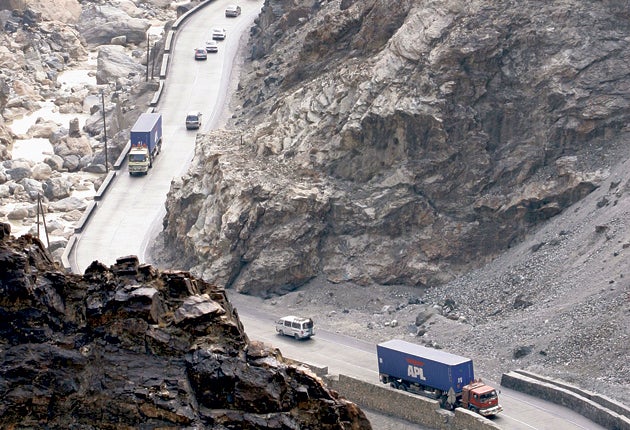Eight tonne cache of explosives seized by Afghan authorities on Pakistan border
Intended for use in 'insurgent activities', spokesman for the governor of Nangarhar province says

Your support helps us to tell the story
From reproductive rights to climate change to Big Tech, The Independent is on the ground when the story is developing. Whether it's investigating the financials of Elon Musk's pro-Trump PAC or producing our latest documentary, 'The A Word', which shines a light on the American women fighting for reproductive rights, we know how important it is to parse out the facts from the messaging.
At such a critical moment in US history, we need reporters on the ground. Your donation allows us to keep sending journalists to speak to both sides of the story.
The Independent is trusted by Americans across the entire political spectrum. And unlike many other quality news outlets, we choose not to lock Americans out of our reporting and analysis with paywalls. We believe quality journalism should be available to everyone, paid for by those who can afford it.
Your support makes all the difference.A huge cache of explosive materials was discovered by Afghan security forces in a vegetable truck crossing from Pakistan, in one of the largest ever finds.
Intelligence officers found nearly eight tonnes of ammonium nitrate - the chemical widely used in making explosives - hidden beneath sacks of vegetables on the vehicle at the Torkham border crossing, at the end of the Khyber Pass.
A spokesman for the governor of Nangarhar province said it was intended for use in “insurgent activities".
Ammonium nitrate is often used as a fertiliser, but since it is often used to make improvised explosive devices, imports into Afghanistan are banned.
The country faces insurgencies from the Taliban, Isis and the Taliban-linked Haqqani network.
Pakistan and Afghanistan frequently accuse each other of harbouring terrorists planning cross-border raids.
A massive truck bomb struck the Afghan capital, Kabul, in May last year, killing more than 150 people.
The Taliban announced a surprise three-day ceasefire over the Muslim Eid holiday this month, their first such offer since their government was toppled by US-led forces in 2001, days after the government declared an unconditional ceasefire of its own.
But the insurgent group was later accused of attacking a security checkpoint in southern Kandahar province, killing five police officers, a spokesman for the provincial governor told Reuters.
The governor of Nangarhar - a region where security has sharply deteriorated of late - was dismissed last month as part of an administrative shakeup.
Officials in Nangarhar said he had failed to tackle endemic corruption in the province, which includes the Torkham post, the main crossing point into Pakistan for both goods and people as well as major smuggling routes.
In August, US President Donald Trump unveiled a more hawkish military approach to Afghanistan, including a surge in air strikes, aimed at forcing the Taliban to the negotiating table.
Foreign air strikes targeted two Islamic State hideouts in the province, killing six insurgents, an Afghan military official told Reuters on Sunday. He did not say when the attack took place.
The Taliban remain openly active across more than two-thirds of Afghanistan.
Join our commenting forum
Join thought-provoking conversations, follow other Independent readers and see their replies
Comments